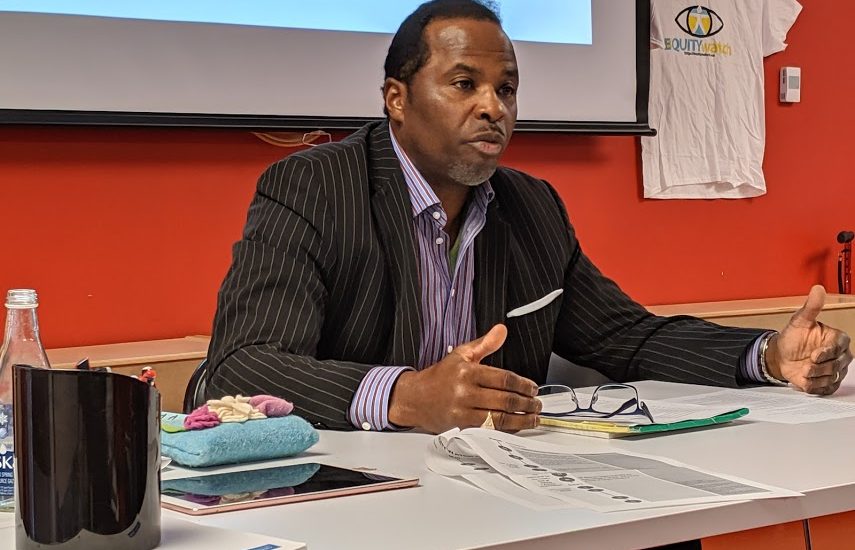
KJIPUKTUK (Halifax) – Yesterday we reported how Equity Watch calls for major structural changes to the Nova Scotia Human Rights Commission to deal with the many complaints about its fairness and timeliness that have been raised over the years.
One of the speakers at the virtual launch of the report was Connor Smithers-Mapp, a Black lawyer with a special interest in human rights and racism. This is what he said.
I’m a lawyer and former Steering Committee member of Equity Watch. From my perspective, looking at the Human Rights regime as a lawyer, it’s readily apparent that there are some very serious flaws, some might say fatal flaws and deficits, in our approach to redressing complaints around racism and discrimination.
I’m sure many of you are aware of the August 21 rally at the headquarters of the Human Rights Commission, under the rubric of Black Lives Matter and human rights. That rally was really precipitated by the frustration that the Black community and others have with the Human Rights Commission, and with its approach to redressing human rights complaints.
Specifically people have lots of complaints around human rights officers, not returning calls or emails or texts, human rights officers being generally dismissive of complaints, human rights officers having a changing threshold in their approach to whether or not they’re going to accept a complaint. When we’ve compared notes, the kinds of reasons for not accepting our complaints are quite frankly, all over the map, and very inconsistent. Moreover, if the complaint is not accepted, the provisions for appeal are virtually non-existent, they are very onerous and expensive in that, for the most part, you have no reasonable prospect for success if you’re appealing unless you have a lawyer. So for those reasons, once the Commission says that they’re not going to handle your case, you are out of luck.
Further, many of us have pointed out the fact that the Commission and the human rights regime generally, is dangerously underfunded and under-resourced, relative to the actual need. And I’m not solely talking about the number of complaints that are reported by the Commission, although just on that basis alone most reasonable people would say that the Commission needs to be more fully resourced, but also if you look at the number of people in marginalized communities who for various reasons don’t make a complaint.
There have been several studies, suggesting that there are a significant number of persons for whom the Human Rights Commission is not a viable route. They will seek redress in other ways and not pursue it at the Commission.
The average number of complaints that reach the penultimate stage of a Board of Inquiry is about five per year. That is woefully low. I would suggest that those five cases made it to Boards of Inquiry because they were pretty close to being slam dunks. The Commission is quite fastidious in choosing cases that they think will be winners. This is a complaint that has appeared for many, many years.
Many people bemoan the fact that complaints winding their way through the Commission are notoriously slow, often taking years. And for people experiencing the trauma of racism and discrimination this essentially acts as another locus of trauma. These people feel in many ways re-victimized. When someone makes a complaint based on racism or discrimination, I think we can safely presume that the person is traumatized, that the person is going through a psychically very difficult period. To have the Commission proceed at a snail’s pace further re-victimizes people who were very vulnerable in the first place.
It’s interesting to note that the American equivalent to our human rights regime, the Equal Employment Opportunity Commission stipulates that the entire pre-complaint stage must not exceed 90 calendar days, and that complaints must be investigated and completed within 180 days, from the filing of the complaint. We really don’t have that. That is extremely problematic.
Another problem, and I think it’s a huge one, is that the Commission stresses remedial efforts like diversity education, and anti-bias training. They’re doing this while there is no empirical evidence that indicates bias can be changed or that the changes will be sustained. So we really should be asking yourself, why are we allowing the Commission to concentrate so many of its efforts around things like diversity, education, and anti-bias training? There is no evidence that it’s effective.
Many would suggest, as I do, that the focus should be on what I call the three P’s, Processes, Policies and Procedures, the kinds of tangible, substantive efforts that can actually make a real change in the culture of organizations and in people’s lives. This is not a question of individual virtue. These problems are systemic. For example, systemic racism isn’t about a few bad actors, and it’s not about asking people to be nice to each other. This is a systemic problem, which begs a systemic response. If we continue to favor remedial efforts and rehabilitation over the three P’s, to the almost total exclusion of punitive measures, things will not change.
Thankfully, in some jurisdictions this has been recognized. In Ontario, for example, the use of higher general damage awards, separate and apart from things like loss of income, is starting to take effect. In jurisdictions like Ontario complainants not only are getting the regular quantum of damages, they’re actually getting damages that recognize the seriousness and trauma involved in these cases. This has the benefit of letting organizations know that if you discriminate, if you treat people unfairly, that if you lose the case there will be significant monetary penalties that you will have to suffer.
And if you look at the American examples, whether it was Texaco, the Gap, or other large corporations who had complaints of racism filed against them, they were forced to pay millions of dollars. Many of these organizations have been studied quite extensively, and for the most part, experts say that these organizations now are actually pretty good, especially relative to what they were before.
The point for me is that if we continue to look only for the smoking gun, or for what people call the Archie Bunker racist, then we will be under-serving many people from marginalized and vulnerable groups. These kinds of racism and discrimination are in many ways more subtle and nuanced, but in some ways more damaging than the more overt types of racism that we saw maybe 20 years ago, 30 years ago. So while it may not be someone calling me a name, it may be an organization refusing to hire or refusing to promote somebody who looks like me. All the while, that same organization may be doing some anti-bias training. Then when a complaint is made, the organization’s default position is to fall back on the fact that they did anti-bias training or they did some diversity training, and that everything is fine. If the commission continues to only look for the smoking gun types of incidents and transactions then Nova Scotians will not be well served.
I’ll conclude by saying that there are many things that the Commission can do to take a more proactive approach, like conducting horizontal audits, equity audits of organizations and institutions, by having subjects go to retail establishments or a nightclub or something like that, or apply for a job and evaluate the differences in approach by that organization, based on whether one of the subjects were a white or Black male, or a subject was a female versus male, and seeing if there are indeed differences in treatment.
See also: Liane Tessier: My case is symbolic of so many problems with the Nova Scotia Human Rights Commission
With a special thanks to our generous donors who make publication of the Nova Scotia Advocate possible.
Subscribe to the Nova Scotia Advocate weekly digest and never miss an article again. It’s free!




Hi
I filed a complaint with the commission in September and have since been given nothing but the run around. I’m at a complete loss for what to do or where to turn for advice. I’ve contacted each of the offices in NS, reached out to the federal commission, called my MP and MLA. And nothing.
Thank you for fighting on behalf of everyone the commission is ignoring.